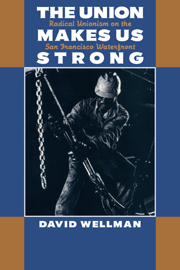Book contents
- Frontmatter
- Contents
- Preface
- Notes on unpublished sources
- PART I LABOR RADICALISM REVISITED
- 1 Unsettling old scores: Labor radicalism encounters conventional wisdom
- 2 Sealing the fate of radical labor theoretically
- 3 A framework for American unionism
- PART II LOCAL COMMUNITY AND “TUMULTUOUS” DEMOCRACY: THE SOCIOCULTURAL FOUNDATIONS OF UNIONISM ON THE SAN FRANCISCO WATERFRONT
- PART III UNIONISM, WORK, AND TECHNOLOGICAL CHANGE
- PART IV WAGING THE BATTLE FOR WORKPLACE CONTROL ON CONTRACTUAL TERRAIN
- PART V AGREEING TO DISAGREE: BEING DEFENSIBLY DISOBEDIENT
- Conclusion: Trade union exceptionalism or prefigurative politics?
- Appendix: Doing field research: An ethnographic account
- References
- Name index
- Subject index
3 - A framework for American unionism
Published online by Cambridge University Press: 11 November 2009
- Frontmatter
- Contents
- Preface
- Notes on unpublished sources
- PART I LABOR RADICALISM REVISITED
- 1 Unsettling old scores: Labor radicalism encounters conventional wisdom
- 2 Sealing the fate of radical labor theoretically
- 3 A framework for American unionism
- PART II LOCAL COMMUNITY AND “TUMULTUOUS” DEMOCRACY: THE SOCIOCULTURAL FOUNDATIONS OF UNIONISM ON THE SAN FRANCISCO WATERFRONT
- PART III UNIONISM, WORK, AND TECHNOLOGICAL CHANGE
- PART IV WAGING THE BATTLE FOR WORKPLACE CONTROL ON CONTRACTUAL TERRAIN
- PART V AGREEING TO DISAGREE: BEING DEFENSIBLY DISOBEDIENT
- Conclusion: Trade union exceptionalism or prefigurative politics?
- Appendix: Doing field research: An ethnographic account
- References
- Name index
- Subject index
Summary
A more complete and complicated framework is needed to assess American unionism, one that distinguishes between formal and informal rules; between stated principles and routine practices; between political principles and the politics of everyday life; between ideological politics and actual contractual relations. An expanded conception of politics is needed, one that includes struggles over power, not just ideology; that includes battles waged on multiple fronts, on informal as well as formal terrain, and argues in colloquial as well as ideological languages, “politics” in the same sense that Big Bill Haywood meant syndicalism was socialist: “with its working clothes on.” Another method for assessing the state of class relations is necessary, one that does not locate the operating rules of class relations in the contract, but rather in the work process and grievance machinery; one that looks for the actual rules governing class encounters in tensions between practices negotiated informally at work and contractual provisions formally agreed upon at the bargaining table. Needed too, is a new framework for assessing the early CIO's accomplishments. If socialism wasn't on the national agenda, what was the “something special” that happened in the 1930s?
A NEW YARDSTICK FOR AMERICAN LABOR RADICALISM
Since neither socialism nor working-class consciousness as defined by a priori socialist expectations was on the 1930s agenda, the question asked of American labor movements should not be why no socialism. Rather, it should be, what did the CIO actually accomplish?
- Type
- Chapter
- Information
- The Union Makes Us StrongRadical Unionism on the San Francisco Waterfront, pp. 35 - 48Publisher: Cambridge University PressPrint publication year: 1995



